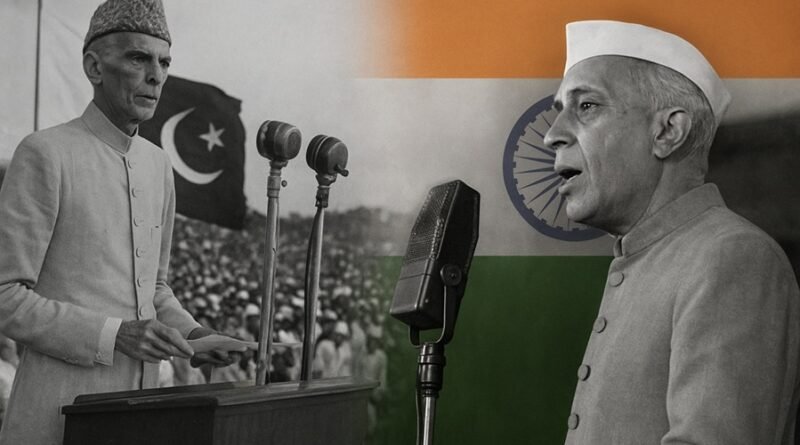Why India and Pakistan Celebrate Independence on Different Days – 15 August vs 14 August
Introduction
The partition of British India in 1947 was one of the most significant events of the 20th century. It gave birth to two sovereign nations — India and Pakistan — after nearly 200 years of British colonial rule.
While both nations were created under the same legislation — the Indian Independence Act 1947 — they celebrate their independence on different days. India marks it on 15 August, whereas Pakistan celebrates on 14 August.
This difference has historical and ceremonial roots, influenced by political, administrative, and even religious factors.
Background – The Indian Independence Act 1947
- Passed by the British Parliament in July 1947.
- Provided for the creation of two independent dominions — India and Pakistan.
- Stated that the transfer of power from British authority to the new governments would take place on 15 August 1947.
- Lord Louis Mountbatten, the last Viceroy of British India, was tasked with overseeing the transition for both nations.
Why Pakistan’s Independence Ceremony Was on 14 August
1. Administrative and Logistical Reasons
In 1947, Karachi was chosen as Pakistan’s first capital. The British administration decided to hold Pakistan’s independence ceremony a day earlier, on 14 August, so that Lord Mountbatten could:
- Attend Pakistan’s official ceremony in Karachi on 14 August.
- Travel to Delhi to attend India’s official ceremony on 15 August.
This arrangement avoided a scheduling conflict and ensured the Governor-General could preside over both events.
2. The Role of the Islamic Calendar
Some historians point out that 14 August 1947 corresponded to 27th Ramadan 1366 AH in the Islamic calendar — a spiritually significant day for Muslims.
This coincidence added symbolic value for Pakistan’s founding leaders, who considered it a blessing that the new nation’s birth coincided with such an auspicious date.
3. Official Adoption in 1948
Interestingly, Pakistan’s first year of independence (1947–48) saw it officially mark independence on 15 August, the date specified in the Act.
However, in 1948, the Government of Pakistan formally declared 14 August as its official Independence Day, emphasizing:
- The date of its own formal ceremony.
- The significance of 27 Ramadan.
From then onwards, 14 August became Pakistan’s permanent national day.
Why India Celebrates on 15 August
1. Legal and Political Foundation
The Indian Independence Act explicitly stated 15 August 1947 as the day when British rule would end in the subcontinent. For India, this was the legal birth date of the nation.
2. Symbolic Significance for Lord Mountbatten
Lord Mountbatten considered 15 August auspicious because it was the second anniversary of Japan’s surrender in World War II (15 August 1945).
This date symbolized victory and peace, and Mountbatten hoped it would mark a hopeful new beginning for India.
3. Midnight Ceremony – The “Tryst with Destiny” Speech
India’s formal independence began at the stroke of midnight between 14 and 15 August 1947.
At that moment, Jawaharlal Nehru, India’s first Prime Minister, delivered his famous “Tryst with Destiny” speech in the Constituent Assembly, marking the nation’s transition to sovereignty.
A Shared Origin, Different Traditions
Although both countries emerged from the same legislation and within 24 hours of each other:
| Country | Official Independence Date | First Celebrated On | Reason for Chosen Date |
|---|---|---|---|
| India | 15 August 1947 | 15 August 1947 | Date in the Act; anniversary of Japan’s WWII surrender |
| Pakistan | 14 August 1947 | Initially 15 August 1947, changed to 14 August in 1948 | Ceremony date; coincided with 27 Ramadan |
Conclusion
The difference in dates for India’s and Pakistan’s Independence Days is rooted in the practical realities of the 1947 partition and the symbolic choices made by each nation.
For India, 15 August represents the legal and ceremonial moment the nation was born. For Pakistan, 14 August reflects the day of its own formal ceremony and its alignment with a significant date in the Islamic calendar.
Though celebrated on different days, both Independence Days mark the end of colonial rule and the beginning of two separate journeys in South Asia’s history.

